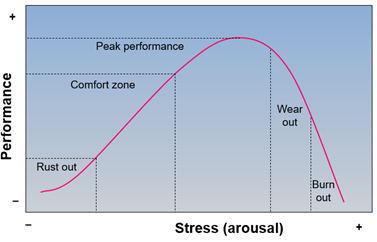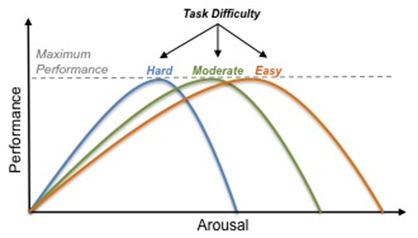Stress, Violence and Alcohol
1/18
There's no tags or description
Looks like no tags are added yet.
Name | Mastery | Learn | Test | Matching | Spaced |
|---|
No study sessions yet.
19 Terms
Sharp End
Police officers, military personnel and those in emergency response roles frequently respond dynamic challenging incidents
Unlike bystanders, the role of ‘operational witnesses’ is to intervene, de-escalate and resolve
Increased likelihood of physical exertion and increased stress levels
Violent - Stress overview
Stress meaning
Physiological response to stressor that is measurable by another party
Stressor must be perceived as negative
Stressed person must feel she has no control over the stressor
Acute Stress (Important)
Short-lived
Triggers fight or flight response
Can be helpful by assisting focus or marshaling resources for a significant physical challenge
Violence - Effect of stress on memory
emotionally arousing events are remembered better than neutral events (e.g., Payne et al., 2006)
neurobiological research suggests that stress hormones can enhance memory consolidation (McGaugh, 2000)
BUT higher levels of stress disrupt hippocampus function and impair memory performance (Shackman et al.,2006)
impaired memory likely reflects the level of stress and task complexity
Serious methodological issues in most eyewitness studies purporting to be about ‘stress’
Optimal level of stress helps us to perform better but when it gets too high it can then hinder performance
Stress and Memory - Yerkes and Dodson curve (1908)

slightly increasing stress actually helps us perform stress but it needs to be managed

If a task is easy we can handle higher levels of stress before you burn out compared to harder task
Violence - SERE (Survival, Evasion, Resistance, Escape)
Morgan et al., 2013
Participants:
861 active-duty military personnel
Procedure Overview:
They were placed in a mock prisoner of war camp
After 12 hrs they were highly stressfully interrogated
Physical punishment, mental torture
After this they were exposed to stress of isolation, sleep and food deprivation for next 36hr
Exposed to misinformation in propaganda speech
Memory was then tested
Results:
Memories for stressful events are also highly vulnerable to misinformation effect
false memory about non-trivial items (i.e., weapons) were observed in at least 27% of participants
higher errors, upwards of 80% of participants, of misinformation about uniforms or human faces
Majority of participants were correct when describing general characteristics about their interrogator (i.e. race, gender, height, build).
most participants were incorrect when describing more detailed characteristics (i.e., one's facial hair, eye color, or shape of face
show that despite any training it is a human feature to have fallibility in memory
Research gap: ‘operational witnesses’
Eyewitness memory is usually tested under optimal encoding conditions (non-stressful)
Responding, acting or re-acting places additional demands on cognition
Training and experience of operational witnesses likely plays an important role
Understanding memory vulnerability in these contexts informs subsequent memory elicitation (e.g. interviewing)
Violence - exertion effects memory (Hope et al 2012)
Serving Canadian police officers
Experimentally tested memory for a ‘live’ staged encounter with a hostile ‘suspect’
following a period of heavy exertion
Results
Officers who had been physically exerted prior
Were less likely to identify the suspect in a lineup
only 27% correctly identified the suspect vs 54% in the control (no exertion) condition
Notably, no impairment in weapon detection
Arousal by competition – priorities processing risk items compared to the competition of other arousal topics
Violence - effect of arousal (Hope et al 2013)
300 UK Authorised Firearms Officers
Experimentally tested memory for a ‘live’ armed hostage scenario
Officers provided statements after incident
Results
Accuracy rates were high for information
93% accurate (range 83-100%)
But further analyses identified many gaps and omissions in the accounts provided
Suggests a performance trade off
Issues if this went to court and you missed stuff out
Effects of arousal and response role on memory - Hope, L. et al. (2016)
80 serving Canadian police officers
Experimentally tested memory for a ‘live’ staged, escalating encounter with an ‘armed suspect’
Officers took part on pairs, randomly assigned to ‘Active Responder’ or ‘Observer’ condition
Results
Physiological arousals
The active officer was significantly more aroused
Free Recall
Significantly fewer correct details reposted by the active person than the observer
No difference in number of incorrect details
No difference in accuracy rates for Free Recall (high at ~96%)
Cued Recall
Overall performance
No differences in the total number of questions answered correctly or incorrectly
Overall, low accuracy rates (M = 57%)
Expectancy and Memory
18% of officers reported that the perpetrator pointed a gun at them in the final phase of the scenario (in free recall) – never occurred in any scenario
How does alcohol affect memory
Doesn’t effect accuracy just the amount of information given
Alcohol and Witnesses
Strong link between alcohol and crime
Likely that many witnesses and victims will be under the influence when they witness a crime
Research - Ray & Bates, 2006
Alcohol interferes with the transference of information from short- to long-term memory because it disturbs the encoding and consolidation
During intoxication, encoding is more superficial due to a lack of rehearsal and other mnemonic strategies
Research - Perry et al., 2006
sudden rise in blood alcohol concentrations (BACs) may produce fragmentary blackouts
This means that parts of the event(s) that took place during intoxication are not consolidated and not remembered afterwards.
Basic Alcohol research
Perception that intoxicated witnesses are perceived as less reliable
Basic research shows that intoxication decreases ability to
Maintain attention
Associate information with existing knowledge
Consolidate information into long-term memory
Intoxication - Field Study Van Oorsouw & Merckelbach, 2012
Overview
110 volunteers were recruited in local bars in Maastricht
75 participants took part in follow‐up memory test
Within 3–5 days, participants were separately sent two memory tests
Free recall
Cued Recall
Results
Both intoxication groups were less complete (i.e. reported less correct information) in their memories of the mock crime than the sober group.
Free recall accuracy did not appear to be affected by high intoxication levels.
Meta-analysis on effect of alcohol
Alcohol has
Significant and moderate effect on number of correct details reported by mock witnesses
No significant effect on incorrect details reported
Correct recall moderated by factors including:
Level of intoxication
Delay between encoding and retrieval
Type of questions asked (free recall versus cues recall)
Flowe et al (2019) - Alcohol and Fake Rape
examined the effects of alcohol consumption and exposure to misleading postevent information on memory for a hypothetical interactive rape scenario
2 beverage (alcohol vs. tonic water) x 2 expectancy (told alcohol vs. told tonic) factorial design
One week later, participants were exposed to a misleading postevent narrative and then recalled the scenario
Participants who were told that they had consumed alcohol rather than tonic reported fewer correct details, but they were not more likely to report incorrect or misleading information
Alcohol expectancy decreases the completeness of testimony but not its accuracy.
Effect of Cannabis - Vredeveldt et al. (2019)
Field study in Amsterdam coffee shops (N = 120)
Participants viewed a videotaped criminal event, were interviewed about the event, and viewed a target-present or target-absent lineup.
Witnesses under the influence of cannabis remembered
Fewer correct details about the witnessed event
No difference in incorrect recall.
Cannabis use was not significantly associated with lineup identification performance,
cannabis on eyewitness suggestibility - Kloft et al (2020)
Examined effects of THC intoxication on susceptibility to false memory/suggestibility
Intoxicated participants showed the highest false memory rates in response to leading questions
vulnerable to suggestive questions while still under acute influence, but this effect disappeared at 1-week follow-up
Challenges for Interviewing
Research shows that arousal/distraction, exertion and intoxication can negatively affect memory in applied contexts
Fewer correct details provided
Accuracy rate not necessarily affected
Important for investigators to take encoding context (and witness state) into account